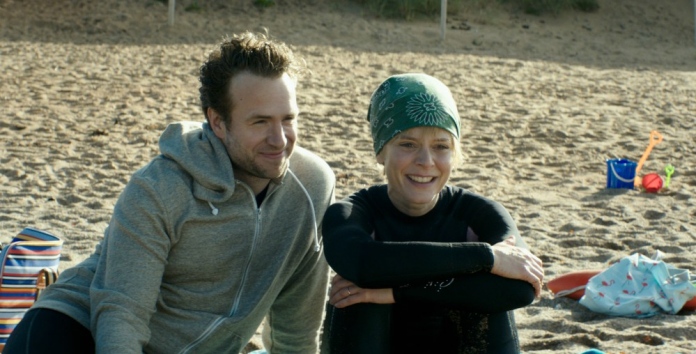It goes without saying that a film concerning a dying mother leaving behind a list of life lessons to her surviving husband and two young sons is going to be a tear-jerker, and the more cynical movie-goer would be a little apprehensive about a film that appears to be taking a somewhat easy approach to evoking sadness. Yet there is a sense of subtlety to Niall Johnson’s latest, that will move you without manipulation. And when I say move, I mean absolutely destroy.
Based, devastatingly, on a true story, Emilia Fox plays Kate, who passes away not too long after being diagnosed with cancer. She leaves behind her husband – and childhood sweetheart, Singe (Rafe Spall) and her two young sons. Singe is lost without the love of his life, left to raise children without a female presence in his, or their lives, having to remain strong for their sake. But she makes the process somewhat easier, leaving behind a series of notes, life lessons for Singe, from kissing the boys twice every day, to dating again after she departs, to ensuring her ashes remain in the boy’s bedroom, just for a while, hoping that the three of them can lead the most rewarding and fulfilling life possible after she’s gone.
Johnson’s production works, primarily, thanks to the pacing and structure of the narrative, the way we seamlessly weave between the present day, when the family are grieving, to flashbacks, back to when the lead pair first fell in love as teenagers, all the way through to when Kate was diagnosed with cancer, to how the illness affected all of their lives, told in a non-linear, and yet fully accessible way, crafted to maximise the emotional impact. Similarly to A Monster Calls – another unbearably upsetting drama concerning a mother leaving behind a young child – we peer into her perspective. Naturally it’s Singe we linger over most, but it’s intriguing to not just see how death can affect those grieving, but the person who knows they’ve not got long left. To hear Kate’s thoughts, what she wants for her family, and how she feels about the fact she won’t be around to see her boys grow, that’s the hardest part to take, and the most absorbing – culminating in the film’s strongest scene where Kate has a monologue to camera, outlining everything she wishes for the three people she cares for most.
Mum’s List is remarkably difficult to sit through, and unrelenting in its emotionality, with little respite from the opening credits right through to the end. There is a criticism you could make that the film is going over rather simple territory, able to move the viewer with little effort – but that doesn’t take away from the resourceful nature Johnson has taken presenting this narrative, exploring certain themes and aspects of the grieving process that aren’t so obvious, more understated, and less spoken about. Frustratingly the song choices conflict with that notion, overtly mawkish, manipulative in their inclusion when they don’t need to be. The material is upsetting enough, we really don’t need to be nudged in that direction by typically melancholic musical numbers.
But that aside the film remains on the right side of sentimentality, and even one-liners such as when Singe and Kate say they love each other ‘acres and acres’ could seem saccharine on the surface, but in the context of the movie, and the paramount relationship, is fitting. Couples do have their silly little in-jokes, and especially those who get together at a young age when too impressionable and not quite self-aware enough (yet) that things like that seem genuinely romantic and not nauseating.
It’s through this that an element of hope shines through, as, amidst the tragedy, the film has a certain uplifting spirit about it, deriving from Kate’s bravery and inclination to be so vocal before her final breath. Just to ensure that the film really is a triumph, Spall and Fox turn in remarkable performances in the lead, particularly the former who avoids cliché, and portrays grief with a certain vacancy behind the eyes, rather than the more cinematic approach of wailing and breaking down. It’s the more understated approach which is all the more affecting, making for a film that while undoubtedly rewarding, is somewhat hard to fully recommend – because it’s bloody devastating.









